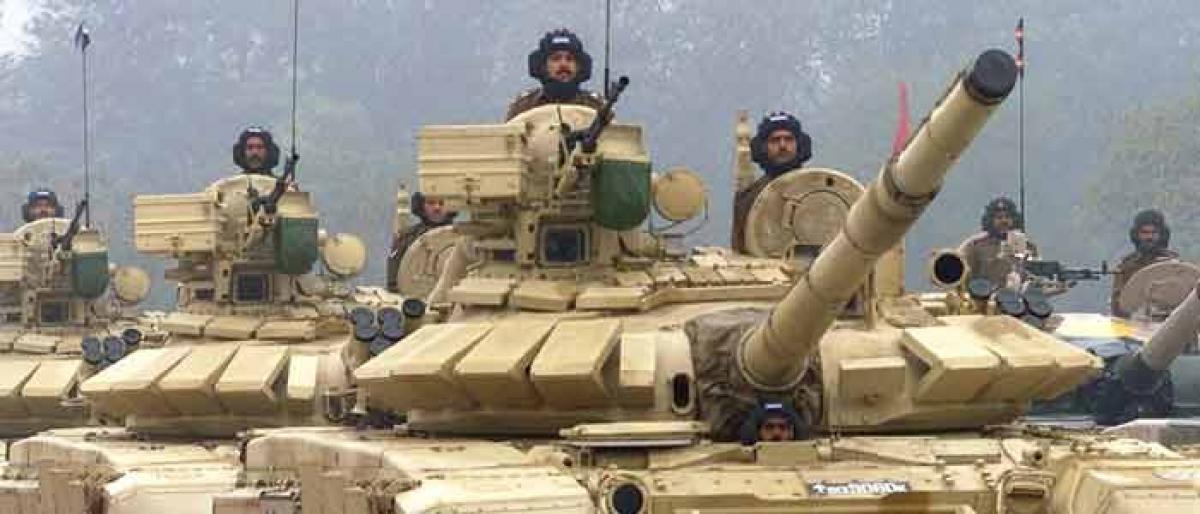Live
- UP: SC’s demolition verdict will help curb organised crime
- Won’t back off from ‘Pharma Village’, says Telangana CM’s brother
- SC order will stop govts from arbitrary house razing: Cong
- AP assembly session: Govt. to introduce five bills today in house Dy. Speaker election at noon
- Reject BJP’s divisive politics in Maha: Uttam
- Travan Core Devasthanam Issues Guidelines for Ayyappa Devotees Visiting Sabari
- Independent candidate slaps election official
- SC parked Yogi’s bulldozer in garage forever: Akhilesh
- No ‘blame game’ over pollution issue: Mann
- 3 Odisha Police officers get ‘Dakshata’ award
Just In

This might seem unlikely, but India has been purchasing arms from the erstwhile Soviet Union from the 1960s (and later from Russia) but forgot the basics -- what in common parlance is referred to as \"after-sales service\".
This might seem unlikely, but India has been purchasing arms from the erstwhile Soviet Union from the 1960s (and later from Russia) but forgot the basics -- what in common parlance is referred to as "after-sales service".
Now, both the countries seem to have woken from their slumber since the non-availability of spares has become a major problem for India, especially for fighter jets like the Sukhoi Su-30MKI, the naval MiG-29 combat jets and Mi-17 V5 helicopters, to name just a few platforms.
But, there's a catch: The Russians want guarantees that they'll get adequate orders. "We are aware of this problem and are working together with India's Ministry of Defence. By our joint efforts, we have made significant progress in this direction over the past year," Sergey Chemezov, the CEO of Rostec Corporation that has under its wing several strategic companies, and Chairman of Rosoboronexport, told this correspondent in an interview.
He, however, added that the issue is "complex," one of the issues being the quality of spares India purchased from third countries, given the lack of supplies from the OEMs (original equipment manufacturers).
"It is important to look at it from both sides – India, the operator of military equipment, and Russia, the supplier of equipment and spare parts," Chemezov said.
"We would like the Ministry of Defence and its units to be as consistent as possible in matters of maintenance, repair and operation of military equipment. There have been cases when the end user purchased spare parts and consumables from other manufacturers, often produced under licence in other countries, which could certainly be cheaper, but it led to problems in the long term," he said.
Chemezov named Bulgaria, the Ukraine and Egypt as some of the countries from where India is purchasing spares for Russian equipment, and added: "When the equipment ceased to function properly, questions and claims were made to Russia."
He said outsourcing may not be the best solution. Russia is interested in setting up facilities in India for making spare parts, but required guarantees about demand.
"Our strategy in this direction is the development of a network of after-sales service centres, a reduction in the timelines and complexity of procedures for delivery of spare parts, and ease of their supply," he said.
"This can be done on Indian territory by creating local capacities together with our partners, within the framework of the Make in India policy. But we need guarantees from the Indian side that this will be in demand. And for this, the relevant decisions and the will of the Indian government and the Ministry of Defence are required," Chemezov said.
According to some estimates, since the early 1960s, India has acquired military equipment worth $45 billion from Moscow, which forms more than 60 per cent of equipment in the inventory of the three services.
As per the latest report of Stockholm International Peace Research Institute (SIPRI), India is the world's largest arms importer, accounting for 13 per cent of global arms imports between 2012 and 2016. Russia supplied 68 percent of arms that India bought in this period.
Chemezov noted that at present, Rosoboron export's portfolio of orders in India exceeds $4 billion. He also stressed that Russia is the only country that is providing 100 per cent technology transfer to India.
"I would like to emphasise that India is Russia's privileged strategic partner. In a tough global competitive environment, by practice we prove that Russian-Indian military-technical cooperation is not only steadily developing but also deepening," he said. "I want to note that only Russia transfers 100 per cent of technologies to India, which allows Indian defence companies to develop their own military production in full," Chemezov added.
By: Anjali Ojha

© 2024 Hyderabad Media House Limited/The Hans India. All rights reserved. Powered by hocalwire.com







